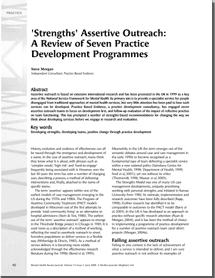The following article was first published in the Mental Health Review Journal (June 2008) and is reproduced with their kind permission.
 Abstract
Abstract
Assertive outreach is based on extensive international research and has been promoted in the UK in 1999 as a key area of the National Service Framework for Mental Health. Its primary aim is to provide a specialist service for people disengaged from traditional approaches of mental health services, but very little attention has been paid to how such services can be developed. Practice Based Evidence, a practice development consultancy, has engaged seven assertive outreach teams to focus on development first, and follow-up evaluation of the impact of reflective practice on team functioning. This has prompted a number of strengths-based recommendations for changing the way we think about developing services before we engage in research and evaluation.
PDF: 'Strengths' Assertive Outreach: A Review of Seven Practice Development Programmes
Excerpt from Part 3: Evaluating a Strengths Approach to Practice Development
Developing a tool to guide and capture the strengths messages
The rationale underpinning a strengths approach led to the development of a 13- item tool to help capture some measurement of how practice development and team functioning can influence positive changes in team practice. The tool should also act as a prompt to areas of good practice, so the items are designed to be a sufficiently comprehensive reflection of ethical issues, care process, team functioning, and an underpinning knowledge base. Yet, this also needs to be a manageable tool (i.e. fitting one side of paper) if it is to engage practitioners interests and be used.
- Ethical practice
- Service users are fully involved in determining the ‘priorities’ for the working relationship.
- As a team, we regularly examine and review the impact of ‘values and principles’ on our practice. Care process
- Time for creative approaches to ‘engagement’ is a priority.
- Our assessment of needs includes the identification of service user ‘strengths’.
- We identify and manage the appropriate opportunities for ‘positive risk-taking’ in practice.
- Our working practice draws on a broad range of ‘practical and research based’ approaches. Team working
- We are clear about our ‘purpose’ as an assertive outreach team.
- We have a clearly agreed model of ‘team-working’ (within team).
- We have effective systems of ‘support and supervision’.
- We have clear processes of ‘decision-making’ in the team.
- We ‘link’ effectively with other parts of the mental health system (including primary care). Knowledge in practice
- We make full use of the ‘diverse’ knowledge, skill and experience within the team.
- We access appropriate expertise from outside of the team.
Developing the method of evaluation
The method focuses on evaluation of changes in practice that gives useful feedback to the teams about their global functioning, as well as indicators to priorities they may choose to focus specific attention on. This is not the same as the approach established in many of the well known research projects examining the effectiveness of assertive outreach. The research approach has been one of top-down influences, whereby external sources examine questions relating to their desire to compare outcomes to other known and established research. The evaluation approach is a bottom-up influence, whereby the practitioners are engaged in reflecting on how their team is performing in relation to practice-based outcomes.